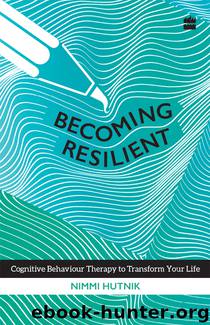Becoming Resilient by Nimmi Hutnik

Author:Nimmi Hutnik
Language: eng
Format: epub
Tags: null
Publisher: HarperCollins Publishers India
Published: 2016-12-23T05:00:00+00:00
People with GAD do a lot of ‘what if …’ thinking. For example, what if the car breaks down, what if I have an accident, what if the police stop me, what if everyone laughs at me? This incessant worrying leads to people going round and round in their heads about umpteen situations. This exacerbates a feeling of anxiety and stress and is extremely exhausting.
Greenberger and Padesky (2015) have developed a problem-solving approach whereby every ‘what if’ is answered with a ‘then what’. Here is an example of this approach:
Sumitra is an anxious mother who constantly worries about her family. She thinks that worrying serves a positive function in that it shows that she really cares about her family. However, her anxiety impacts all the others in the family who get really quite fed up with her constant cycles of worry. She also feels drained by not being able to control her worrying. Below are her worries and nervous thoughts that were focused on her son:
What if … Then what?
What if my son gets ill at school? Then the teacher will send him to the school nurse who is a qualified professional. She will know what to do. If I have to pick him up myself, my boss is very understanding and will let me have the afternoon off
What if his teacher thinks I’m mad and neurotic? Then I’m probably acting on an unhelpful core belief. Anyway, what other people think of me is none of my business! I don’t have to accept what she thinks of me
What if my son eats unhealthy food when I’m not there? Then that’s his choice. I cook him healthy meals at home and he eats plenty of fresh fruit and vegetables at home and gets physical exercise. One or two chocolate bars won’t hurt him. I can teach him about how to live healthily and encourage him
What if my son starts getting bad grades? Then I will still love him no matter what happens. I could meet with his teacher to check that there are no problems. I could also help him more with homework or pay for him to have a tutor.
CHALLENGING UNHELPFUL THINKING ABOUT THE POSITIVE NATURE OF WORRY
One of the stumbling blocks to getting over GAD is that many sufferers think that worrying is useful and symbolizes care. In other words, they have a number of positive beliefs about worry and these positive beliefs stand in the way of becoming less anxious and shedding unnecessary worry altogether. In Chapter 3 we learnt to use the thought record and behavioural experiments to challenge unhelpful thinking. They are useful here as well.
Sumitra looked at her positive beliefs about worry. She realized that she had an ‘If… then…’ statement that captured these. ‘If I don’t worry about my family, then they will think I do not care about them.’
She decided to refrain from worry on Monday, Tuesday and Wednesday, and then worry a lot on Thursday, Friday and Saturday. She then asked her son on which days in the past week did he feel her love and care most.
Download
This site does not store any files on its server. We only index and link to content provided by other sites. Please contact the content providers to delete copyright contents if any and email us, we'll remove relevant links or contents immediately.
The Four Agreements by Don Miguel Ruiz(6765)
Flow by Mihaly Csikszentmihalyi(4697)
The Four Tendencies by Gretchen Rubin(4602)
Adulting by Kelly Williams Brown(4574)
You Do You by Sarah Knight(4467)
The Hacking of the American Mind by Robert H. Lustig(4383)
Ikigai by Héctor García & Francesc Miralles(4274)
Right Here, Right Now by Georgia Beers(4211)
A Simplified Life by Emily Ley(4161)
The Art of Happiness by The Dalai Lama(4130)
The Power of Positive Thinking by Norman Vincent Peale(4064)
The Little Book of Hygge by Meik Wiking(3693)
The French Women Don't Get Fat Cookbook by Mireille Guiliano(3661)
The Heroin Diaries by Nikki Sixx(3550)
The Courage to Be Disliked by Ichiro Kishimi & Fumitake Koga(3504)
The Choice by Edith Eva Eger(3469)
Why Buddhism is True by Robert Wright(3453)
Spark Joy by Marie Kondo(3302)
Make Your Bed by William H. Mcraven(3180)
